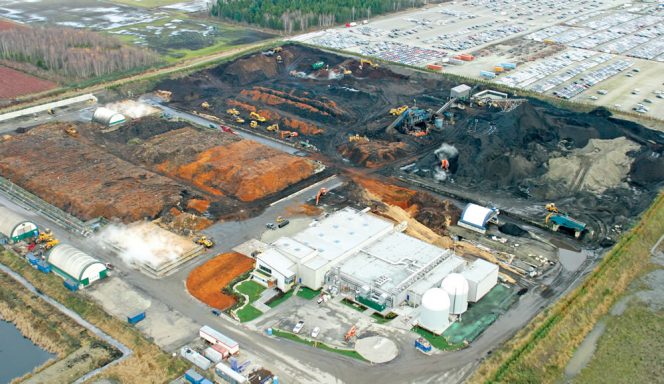Richmond, British Columbia facility scales back operations while making significant improvements to its materials handling and odor control systems.
Peter Gorrie
BioCycle January 2017
Harvest Power has reduced operations at its large biogas and composting facility in British Columbia, Canada, and apologized to nearby residents, as it works to reduce odors that prompted more than 1,200 complaints during the past 14 months and threaten its operating permit.

The Harvest Fraser Richmond Organics facility outside of Vancouver, BC processed about 248,000 tons of source separated organics and yard trimmings in 2015.
With that intake, the digester produced biogas that could generate about 6,500 megawatt-hours of electricity annually. Composting the digestate and other inputs created 180,000 cubic yards of soil amendments.
But odor complaints multiplied during the past year, as the aerobic composting system aged and the facility faced a growing backlog of material to be processed. Meanwhile, Harvest Power was applying to Metro Vancouver for a new air emissions permit that would run until April 2020.
To the dismay of many Richmond residents and politicians, the region issued the permit on September 30, 2016, however the extension imposes stringent air quality requirements. Regional officials said their aim was to give Harvest Power an opportunity to improve its operation rather than risk a lengthy legal battle with the company over what, without the permit, would amount to a shutdown order.
Site Improvements
Harvest Power, in return, is undertaking millions of dollars worth of short- and long-term improvements intended to alleviate all odor issues by 2018. Its president and CEO Chris Kasper also issued an apology in a November 2 letter to the community: “We are sorry. … We are proud to have worked with you toward building the best organics recycling program, with the highest diversion rates in North America. We strive to operate in a manner consistent with being a good neighbor. But it is clear that we have let you down.”
The odor reduction measures include:
• Reducing intake volume of SSO by 47 percent, and of all materials by 20 percent. The facility no longer accepts exceptionally odorous material such as waste from cruise ships and chicken hatcheries, as well as any material from outside the Metro Vancouver region. The reduction also incorporates decisions by the City of Richmond and the regional government to divert some of their organics to other processors.
• Voluntarily suspending operation of the Energy Garden anaerobic digester. This measure is temporary, “but there is no timeline for restarting” the digester, says Stephen Bruyneel, the company’s British Columbia spokesperson.
• Refurbishing the Covered Aerobic Static Pile (CASP) system with a new cover, refreshing or replacing the substrate, and repairing or replacing most of the piping for better aeration.
• Refreshing or replacement of the biofilter material.
• With the lower volume coming in, reducing the height of the compost piles from 19.5 to 9.8 feet, again to improve aeration.
• Adding grinders and other equipment for better pretreatment and mixing of material to be composted.
• Improving pretreatment of AD digestate before it is added to the other materials for aerobic composting.
• By 2018, the company intends to replace the CASP and biofilter systems. Pilot projects to test potential replacement systems are to be run this summer.
Meanwhile, Harvest Power and its critics have both launched appeals against the air emissions permit. Many of the critics want the permit revoked and the operation shut down. At a public meeting in December, about 80 residents expressed frustration and concern over how long it is taking to get odor issues under control. More than 1,100 people have signed a petition calling for the facility’s odors to be quickly eliminated “either through it closing or being regulated into compliance.”
Harvest Power says that while it supports most of the conditions in the 46-page permit, its main concern is a provision for enforcement officers’ “sniff” tests. According to the permit, starting in January 2017, Harvest Power must stop taking in SSO should odors be detected beyond a three mile (5 km) radius of the facility for more than 10 minutes on four separate days within a two week span.
The test is to get more stringent: In 2018, the limit would drop to three odor episodes over two weeks within 2.5 miles (4 km) of the facility, and, the following year, two episodes within 1.8 miles (3 km). The standard is “vague, subjective and unscientific,” according to Bruyneel. Nevertheless, he says the company intends to continue the remediation work during the appeal process: “We remain committed to the operational and capital upgrades currently underway to reduce odors.”
Peter Gorrie is a Contributing Editor to BioCycle.










